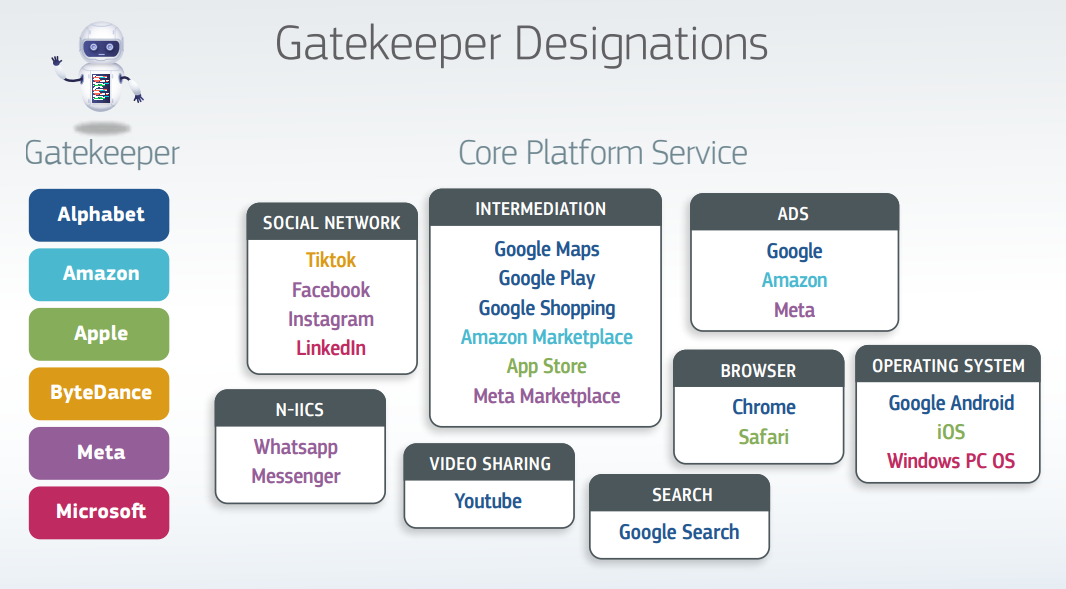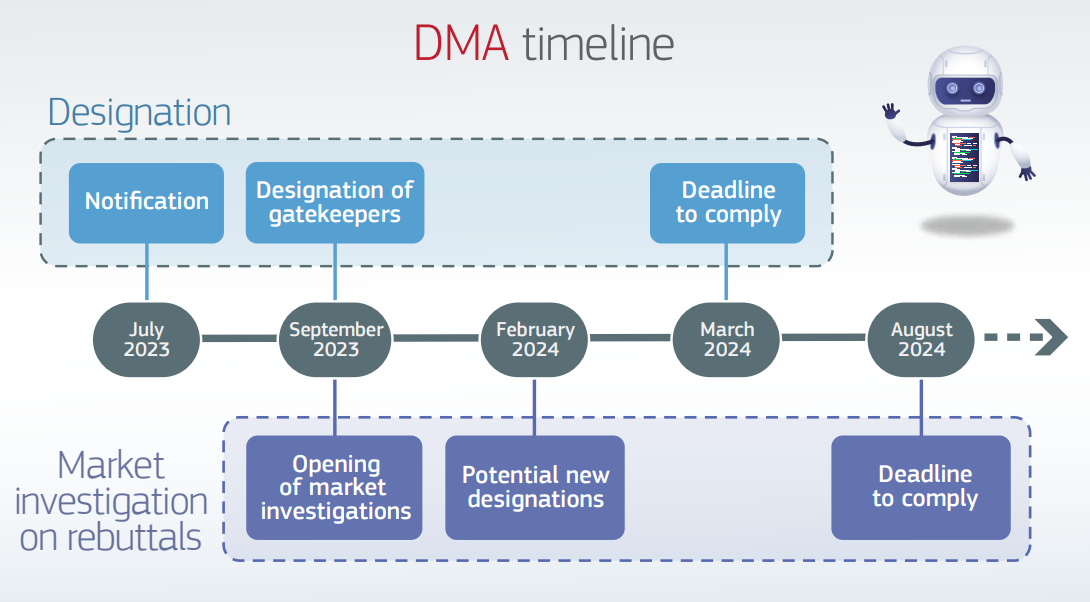The European Commission has designated six tech companies as gatekeepers under the Digital Markets Act (DMA). Alphabet (Google), Amazon, Apple, ByteDance, Meta (Facebook) and Microsoft are the gatekeepers.
The DMA aims to preserve a neutral market for digital services by preventing gatekeepers from imposing unfair conditions on users, while maintaining the freedom of the services. Any digital service which has over 45 million active monthly users, and/or has a market capitalization of at least 75 billion euro or an annual turnover of 7.5 billion, would meet the threshold set by the Digital Markets Act, to qualify as a gatekeeper.
It covers 10 core services including Online intermediation services, search engines, social networking sites, video-sharing platforms, Number-independent interpersonal communication services (N-IICS), Operating systems, Cloud computing services, Advertising services, Web browsers and Virtual assistants.
The EU identified 22 core platform services which are provided by gatekeepers and designated them accordingly.

List of core platform services designated as gatekeepers
- Social Network: TikTok (ByteDance), Facebook, Instagram, LinkedIn
- Intermediation: Google Maps, Google Play, Google Shopping, Amazon Marketplace, App Store, Meta Marketplace
- N-IICS: WhatsApp, Messenger
- Advertising services: Google, Amazon, Meta
- Video Sharing: YouTube
- Browser: Chrome, Safari
- Search: Google Search
- Operating Systems: Google Android, iOS, Windows PC OS
The list almost consists entirely of U.S. companies with the only exception being TikTok, whose parent company, ByteDance is based in China.
EU to review the Microsoft Bing and iMessage situation
A few days ago, we reported that Apple and Microsoft had asked the EU to remove iMessage and Bing from the list of designated gatekeepers. It appears that the Commission has accepted their appeals, for now. So, don't expect RCS in iMessage anytime soon, or for the app to open itself to other services like WhatsApp, Signal, Telegram, etc.
Microsoft's Bing search engine, Edge browser, and Microsoft Advertising have not been designated yet. Both companies have presented a rebuttal to explain why their services should not be designated. This isn't a final decision, and the EU's Commission says it will conclude the investigation regarding these services within 5 months, to determine whether the services qualify as gatekeepers or not.
Apple's iPadOS could be designated as a gatekeeper, even though it does not meet the thresholds. The Commission's investigation is expected to be finished within 12 months.
Email services
The EU's statement says that though Gmail and Outlook met the thresholds under the DMA, both Alphabet and Microsoft provided sufficient arguments that proved the email services do not qualify as gatekeepers. Similarly, Samsung had also provided data for its mobile app, Samsung Internet Browser, to not be designated as a gatekeeper for core platform services.
Role of a gatekeeper
Each service that has been designated as a gatekeeper will have its own set of laws to follow, i.e. rules for an operating system will differ from the laws related to search engines, etc.
Operating systems will be required to let the user choose the browser, virtual assistant and search engine of their choice. Microsoft cannot force users to use Bing or Edge. Apple will have to open up its iOS operating system to allow third-party app stores, aka allow sideloading of apps. Google, on the other hand, will need to provide users with the ability to uninstall preloaded apps (bloatware) from Android devices. Online services will need to allow users to unsubscribe from their platform easily. Gatekeepers need to provide interoperability with third-parties that offer similar services. The full list of the DMA's dos and don'ts can be found here.

Gatekeepers have 6 months to comply with the DMA's laws to offer more choice and freedom to end users, business users. That means the companies would have until March 2024 to fall in line with the rules.
Failure to comply with the DMA, such as preferring its own apps and services, could result in a fine of up to 10% of the gatekeeper's total worldwide turnover in the preceding financial year. This could raise up to 20% in case of repeated infringements. In the event of systematic infringements, the EU could impose a ban to prevent the gatekeeper from acquiring other companies, or even oblige the gatekeeper to sell a business or parts of it.
Gatekeepers are not happy with the decision
Apple said (via Reuters) it is concerned about the privacy and security risks that the DMA could cause for its products and services. ByteDance has also criticized the EU's decision to designate TikTok as a gatekeeper. A company spokesperson has said that the move protects actual gatekeepers from competitors like TikTok.
Amazon is working with the EU's Commission to implement its plans. Google and Meta (Facebook) are reportedly evaluating the situation. Microsoft has accepted its designation as gatekeeper, and said that it welcomed the investigation regarding the exemption of some of its services.
Thank you for being a Ghacks reader. The post EU designates 6 tech companies as gatekeepers under DMA appeared first on gHacks Technology News.

0 Commentaires